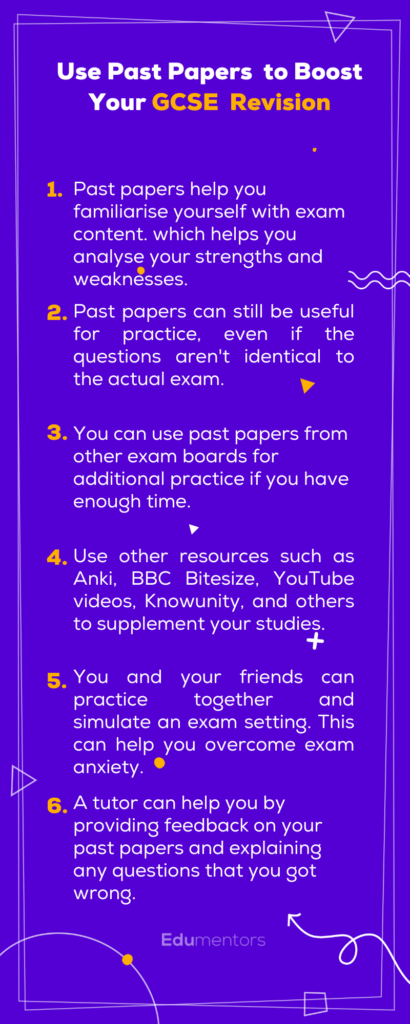Table of Contents:
AQA
AQA GCSE Spanish Foundation Tier
AQA Paper 1 Foundation – Listening
| Transcript | Question Paper | Mark Scheme |
| June 2018 | June 2018 | June 2018 |
| June 2019 | June 2019 | June 2019 |
| November 2020 | November 2020 | November 2020 |
| November 2021 | November 2021 | November 2021 |
AQA Paper 2 Foundation – Speaking
AQA Paper 3 Foundation – Reading
| Question Paper | Mark Scheme |
| June 2018 | June 2018 |
| June 2019 | June 2019 |
| November 2020 | November 2020 |
| November 2021 | November 2021 |
AQA Paper 4 Foundation – Writing
| Question Paper | Mark Scheme |
| June 2018 | June 2018 |
| June 2019 | June 2019 |
| November 2020 | November 2020 |
| November 2021 | November 2021 |
AQA GCSE Spanish Higher Tier
AQA Paper 1 Higher – Listening
| Transcript | Question Paper | Mark Scheme |
| June 2018 | June 2018 | June 2018 |
| June 2019 | June 2019 | June 2019 |
| November 2020 | November 2020 | November 2020 |
| November 2021 | November 2021 | November 2021 |
AQA Paper 2 Higher – Speaking
AQA Paper 3 Higher – Reading
| Question Paper | Mark Scheme |
| June 2018 | June 2018 |
| June 2019 | June 2019 |
| November 2020 | November 2020 |
| November 2021 | November 2021 |
AQA Paper 4 Higher – Writing
| Question Paper | Mark Scheme |
| June 2018 | June 2018 |
| June 2019 | June 2019 |
| November 2020 | November 2020 |
| November 2021 | November 2021 |
Pearson Edexcel
Edexcel GCSE Spanish Foundation Tier
Edexcel Paper 1 Foundation – Listening
| Transcript | Question Paper | Mark Scheme |
| June 2018 | June 2018 | June 2018 |
| June 2019 | June 2019 | June 2019 |
| November 2020 | November 2020 | November 2020 |
| November 2021 | November 2021 | November 2021 |
Edexcel Paper 3 Foundation – Reading
| Question Paper | Mark Scheme |
| June 2018 | June 2018 |
| June 2019 | June 2019 |
| November 2020 | November 2020 |
| November 2021 | November 2021 |
Edexcel Paper 4 Foundation – Writing
| Question Paper | Mark Scheme |
| June 2018 | June 2018 |
| June 2019 | June 2019 |
| November 2020 | November 2020 |
| November 2021 | November 2021 |
Edexcel GCSE Spanish Higher Tier
Edexcel Paper 1 Higher – Listening
| Insert | Question Paper | Mark Scheme |
| June 2018 | June 2018 | June 2018 |
| June 2019 | June 2019 | June 2019 |
| November 2020 | November 2020 | November 2020 |
| November 2021 | November 2021 | November 2021 |
Edexcel Paper 3 Higher – Reading
| Question Paper | Mark Scheme |
| June 2018 | June 2018 |
| June 2019 | June 2019 |
| November 2020 | November 2020 |
| November 2021 | November 2021 |
Edexcel Paper 4 Higher – Writing
| Question Paper | Mark Scheme |
| June 2018 | June 2018 |
| June 2019 | June 2019 |
| November 2020 | November 2020 |
| November 2021 | November 2021 |
WJEC Eduqas
WJEC Eduqas Foundation Tier
Eduqas Foundation tier – Component 2 – Listening
| Insert | Question Paper | Mark Scheme |
| June 2018 | June 2018 | June 2018 |
| June 2019 | June 2019 | June 2019 |
| November 2020 | November 2020 | November 2020 |
Eduqas Foundation tier – Component 3 – Reading
| Question Paper | Mark Scheme |
| June 2018 | June 2018 |
| June 2019 | June 2019 |
| November 2020 | November 2020 |
Eduqas Foundation tier – Component 4 – Writing
| Question Paper | Mark Scheme |
| June 2018 | June 2018 |
| June 2019 | June 2019 |
| November 2020 | November 2020 |
WJEC Eduqas Higher Tier
Eduqas Higher tier – Component 2 – Listening
| Insert | Question Paper | Mark Scheme |
| June 2018 | June 2018 | June 2018 |
| June 2019 | June 2019 | June 2019 |
| November 2020 | November 2020 | November 2020 |
Eduqas Higher tier – Component 3 – Reading
| Question Paper | Mark Scheme |
| June 2018 | June 2018 |
| June 2019 | June 2019 |
| November 2020 | November 2020 |
Eduqas Higher tier – Component 4 – Writing
| Question Paper | Mark Scheme |
| June 2018 | June 2018 |
| June 2019 | June 2019 |
| November 2020 | November 2020 |
FAQ About GCSE Spanish

What content is covered in GCSE Spanish?
The GCSE Spanish syllabus covers a wide range of topics and language skills. It is designed to help students develop their language skills in a variety of contexts and a broad understanding of the culture of countries and communities where Spanish is spoken.
Topics
GCSE Spanish typically includes themes related to identity and culture, local area, holiday and travel, school, future aspirations, study and work, and international and global dimensions. These broad themes cover more specific topics such as family and friends, technology, free-time activities, customs and festivals, social issues, global issues, and life in Spanish-speaking countries or communities.
Language Skills
The GCSE course focuses on four key language skills:
- Listening
- Speaking
- Reading
- Writing
Grammar and Vocabulary
The course covers a wide range of vocabulary and grammatical structures. Students are expected to understand and use various tenses and moods, as well as complex sentences, idiomatic expressions, and more.
Culture
An understanding of Spanish-speaking cultures is integrated throughout the course. Students may learn about traditions, history, societal norms, literature, film, music, and more in Spanish-speaking countries.
It’s important to remember that the exact content can vary between different exam boards (AQA, Edexcel, etc.) in the UK, so you should refer to the specific syllabus for the most accurate information.
How Many Papers are There in GCSE Spanish?
In the GCSE Spanish examination, there are typically four papers or components, each testing a different skill:
Paper 1 – Listening
This paper tests your ability to understand spoken Spanish. It usually has both Foundation Tier (easier) and Higher Tier (more challenging) options.
Paper 2 – Speaking
In this component, you’re expected to demonstrate your speaking skills in Spanish. It may include a role-play, a photo description, and a general conversation.
Paper 3 – Reading
This paper tests your comprehension of written Spanish. Like the listening paper, it usually has both Foundation and Higher Tier options.
Paper 4 – Writing
This paper requires you to write in Spanish, often including short and long-form responses to given stimuli or prompts. As with the other papers, there are Foundation and Higher Tier options.
Each of these components typically accounts for 25% of the total GCSE Spanish grade. However, again, the structure and format of the exams may vary between different examination boards.
What Level of Spanish is GCSE Spanish?
GCSE Spanish is approximately equivalent to level A2/B1 on the Common European Framework of Reference for Languages (CEFR), which is used to measure language ability across Europe. This means that by the end of the course, students should be able to:
- Understand the main points of clear standard input on familiar matters regularly encountered in work, school, leisure, etc.
- Deal with most situations likely to arise while traveling in an area where the language is spoken.
- Produce simple connected text on topics that are familiar or of personal interest.
- Describe experiences and events, dreams, hopes, and ambitions, and briefly give reasons and explanations for opinions and plans.
Can You Take GCSE Spanish without Any Prior Knowledge?
Regarding previous knowledge, while it is beneficial to have some basic understanding of Spanish before starting a GCSE course, it is not always necessary. The GCSE course is designed to be accessible to students who have studied the language at Key Stage 3, but it should also be suitable for students who are starting from scratch or who have some informal knowledge of the language.
However, if a student is starting with no prior knowledge of Spanish, it may require additional effort and time to reach the expected level by the end of the course. Schools often provide resources and support to help students catch up if needed. It’s always a good idea to discuss this with the school or the teacher if you’re unsure about your current level.
How Hard is GCSE Spanish?
The difficulty of GCSE Spanish, as with any subject, can vary greatly depending on a student’s aptitude, previous experience with the language, and the amount of effort and dedication they put into studying.
Aptitude for Languages
Some people have a natural aptitude for languages, which can make learning Spanish easier. This includes having a good memory for vocabulary, an ability to understand grammar concepts, and a knack for picking up accents and pronunciation.
Previous Experience
If a student has previously studied Spanish or another Romance language like French or Italian, they may find some aspects of GCSE Spanish easier. Familiarity with a similar language can make it easier to understand Spanish vocabulary and grammar.
Study Habits
Consistent and focused study can significantly impact the perceived difficulty of GCSE Spanish. Regular practice, especially speaking and listening to Spanish, can make the learning process more manageable.
Support Resources
The availability and use of supportive resources, like a helpful teacher, private tutor, language learning apps, or practice books, can also make a difference.
Language Complexity
Compared to some other languages, Spanish is often considered one of the easier languages for English speakers to learn, due to its relatively straightforward pronunciation and many shared vocabulary words. However, it does have its complexities, such as verb conjugation and using different tenses accurately.
What kind of study materials and resources are helpful for GCSE Spanish?
There are numerous study materials and resources available to help students prepare for GCSE Spanish. These include:
Textbooks and Workbooks
Many publishers release textbooks and workbooks specifically designed for GCSE Spanish. They follow the syllabus closely and often include practice questions, grammar exercises, vocabulary lists, and cultural information.
Online Resources
Websites like BBC Bitesize, Memrise, and Quizlet offer valuable resources for learning and practicing Spanish, including interactive exercises, games, and quizzes.
Revision Guides
These can be helpful for reviewing key topics and for test preparation. They often condense the syllabus into manageable chunks and include practice questions and answers.
Past Papers
Practicing with past papers from your exam board (e.g., AQA, Edexcel, OCR) can help familiarise you with the exam format and time constraints. They can also help you understand the level of detail required in your answers.
Language Learning Apps
Apps like Duolingo, Babbel, and Rosetta Stone can provide additional practice and reinforcement, particularly for vocabulary and grammar.
Listening Practice
To improve listening skills, use Spanish-language music, podcasts, and movies. Websites like Spanish Listening and Notes in Spanish provide listening exercises at various levels.
Speaking Practice
Speaking regularly is essential. Try language exchange websites, where you can practice with native speakers, or use language learning platforms that offer speaking practice with tutors.
Tutors or Study Groups
Working with a tutor or joining a study group can provide personalised feedback and support.
Spanish Language Literature and Media
Reading Spanish newspapers, magazines, or books, and watching Spanish TV shows, films, or YouTube channels can significantly enhance your understanding of the language and culture.
It’s important to use a combination of resources to practice all aspects of the language – listening, speaking, reading, and writing – and to consistently review and reinforce what you’ve learned.
How can I improve my listening skills for GCSE Spanish?
Improving listening skills in any language, including Spanish, requires consistent and varied practice. Here are some methods you can use to enhance your listening skills for GCSE Spanish:
Listen to Spanish Music
Songs can help you get used to the sound and rhythm of the language. Try to follow along with the lyrics and understand what they mean.
Watch Spanish TV Shows and Films
This can help you get used to various accents and colloquial language. Use subtitles initially, then gradually try to rely on them less.
Use Language Learning Apps and Websites
Platforms like Duolingo, Rosetta Stone, or FluentU have exercises specifically designed to improve listening skills.
Listen to Spanish Podcasts or Radio Stations
Podcasts are a great way to improve your listening skills as they come in all kinds of topics and lengths. Choose topics that interest you to make it more engaging.
Use GCSE Practice Listening Exams
Many exam boards provide practice listening exams. These can be very beneficial, as they mimic the actual exam experience and content.
Try Audiobooks or Stories in Spanish
Listening to stories can help improve comprehension skills, and you can find materials appropriate for various skill levels.
Take Advantage of Online Resources
Websites such as SpanishListening offer a variety of listening exercises with different accents and topics.
Language Exchange
Practise listening to native speakers by engaging in language exchanges, either in person or through online platforms.
Remember, it’s important to start with simpler, slower-paced content if you’re a beginner, then gradually move to more complex and natural-speed material as your skills improve. Consistency is key, so try to make listening practice a part of your daily routine.
How is the speaking part of the exam conducted?
The speaking part of the GCSE Spanish exam is conducted as an oral assessment, usually with a teacher or an external examiner. The aim is to assess the candidate’s ability to communicate and express themselves in Spanish. The exact structure of the speaking exam can vary depending on the examination board (e.g., AQA, Edexcel, OCR), but it typically includes the following components:
1. Role-Play
The candidate is given a role-play card that outlines a particular situation. The candidate must then engage in a dialogue in Spanish, playing the given role. The role-plays are designed to mimic real-life scenarios, such as booking a hotel room or ordering at a restaurant.
2. Photo Card Discussion
The candidate is shown a photo and must respond to questions about it in Spanish. They typically have a short period of preparation time to study the photo before the discussion begins.
3. General Conversation
The candidate engages in a discussion with the examiner on two topics. These topics are typically chosen in advance from the list provided in the syllabus. They could include themes like family and friends, technology, hobbies, holidays, school life, future plans, or cultural topics related to Spanish-speaking countries.
The speaking exam is usually recorded, and the recording is sent to the examination board for marking. Before taking the exam, it’s important to understand the marking criteria, which typically consider the range and accuracy of vocabulary and grammar used, the fluency and spontaneity of the conversation, and the pronunciation and intonation. Regular speaking practice, both structured (like the role-play and photo card scenarios) and spontaneous (like the general conversation), can be very helpful in preparing for this part of the exam.
What's the best way to prepare for the writing component?`
Preparing for the writing component of the GCSE Spanish exam involves building a strong foundation in grammar and vocabulary, practicing writing regularly, and understanding the exam format and expectations. Here are some strategies:
Learn and Practice Vocabulary
You need to have a wide range of vocabulary to express yourself clearly in writing. Regularly learning new words and phrases and revising them can help.
Understand Grammar
A good grasp of Spanish grammar, including verb conjugations, tenses, and sentence structure, is crucial for writing accurately. Use grammar exercises in your textbook or find resources online to practice.
Write Regularly
Regular writing practice in Spanish is key. Start with simple sentences, then gradually build up to paragraphs and longer texts. Write about a variety of topics to expand your vocabulary and learn to express yourself in different contexts.
Use Past Papers
Practice with past papers from your exam board. This can help you understand the format and type of questions you’ll be asked, as well as the level of detail required in your answers. Time yourself to practice working under exam conditions.
Get Feedback
Have your writing checked by a teacher, tutor, or native Spanish speaker, if possible. They can provide feedback on your grammar, vocabulary, spelling, and overall structure, and help you improve.
Plan Your Writing
In the exam, take some time to plan your writing before you start. Think about the points you want to include, the vocabulary and phrases you want to use, and how you will structure your text.
Revise Key Phrases
Learn some key phrases, transition words, and idiomatic expressions that you can use in your writing. This can make your writing more fluent and natural.
Check Your Work
Always leave a few minutes at the end of the exam to check your work for any mistakes or omissions.
Remember, the best way to improve your writing is through regular, focused practice. With time and effort, you’ll see progress in your ability to express yourself in written Spanish.
Private Tutor
Hiring a private GCSE Spanish tutor offers personalised attention and tailored lessons to address your specific needs. Tutors focus on areas where you need improvement, ensuring efficient and effective learning. They provide structured guidance, helping you master grammar, vocabulary, speaking, and listening skills.
Private tutors also offer flexible scheduling, fitting lessons into your busy timetable. With their expertise, you gain confidence and develop a deeper understanding of the language, leading to better exam performance. Investing in a private tutor can make a significant difference in achieving top grades in your GCSE Spanish exams.







